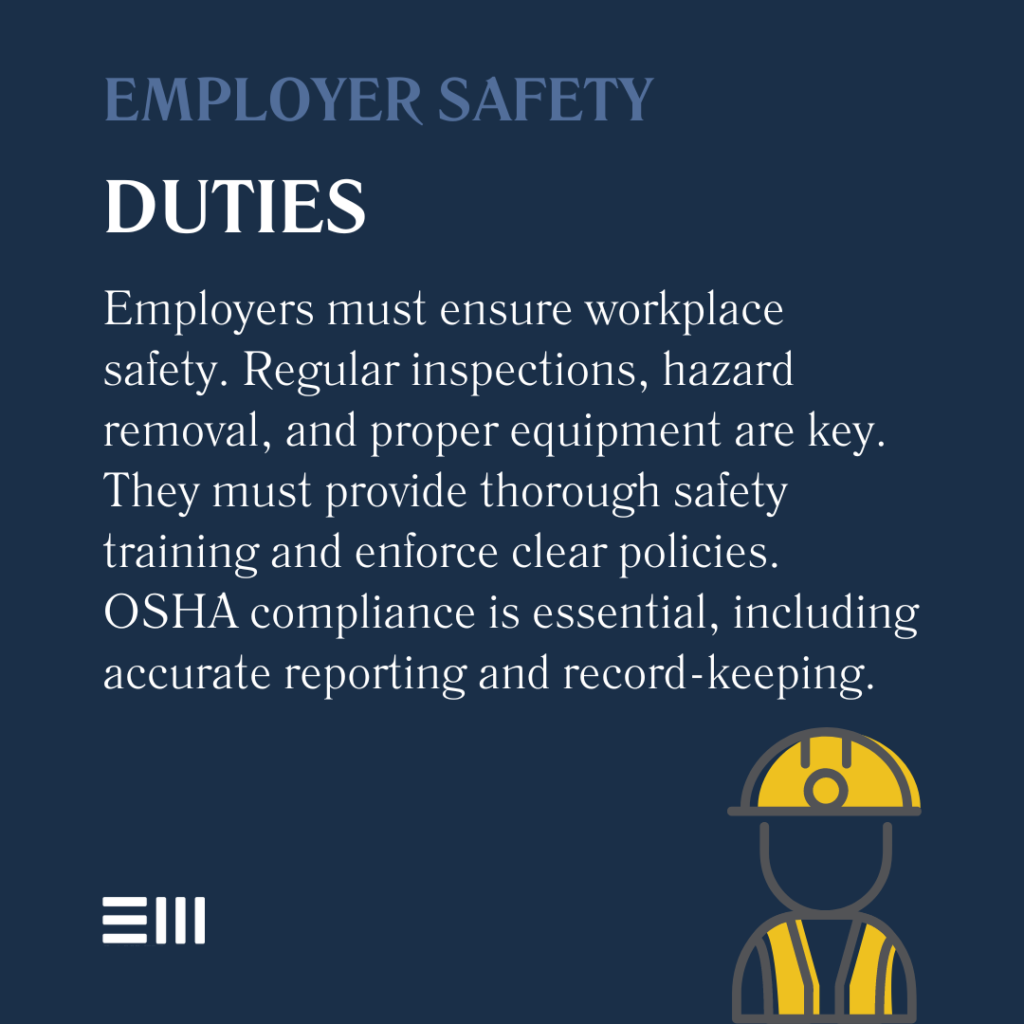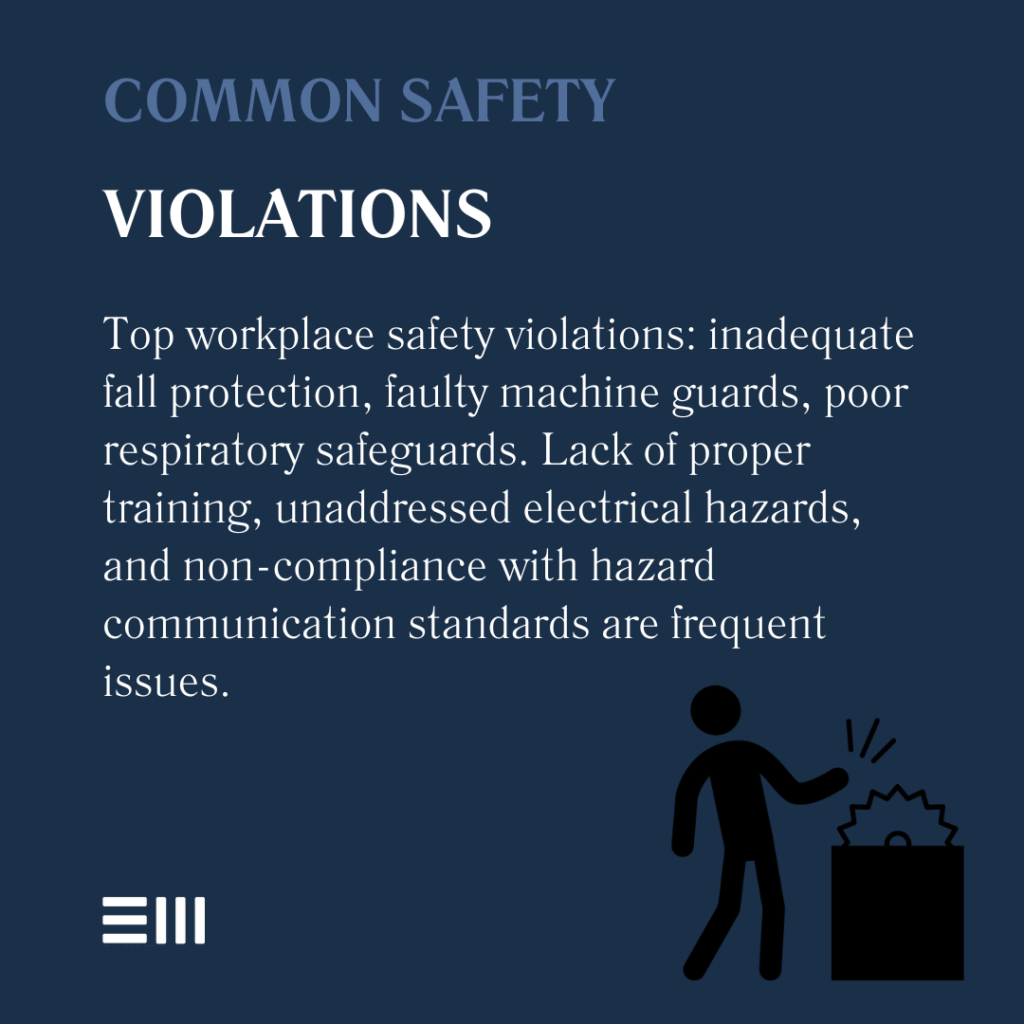
Did you know that in 2022, Alabama reported 74 fatal occupational injuries, with the construction industry accounting for the highest number of fatalities?
This sobering statistic underscores the critical importance of workplace safety and the need for both employers and employees to understand their rights and responsibilities.
Employer Responsibilities in Workplace Safety
Employers in Alabama have a legal and moral obligation to provide a safe working environment for their employees.
This responsibility encompasses various aspects of workplace safety and accident prevention.
Creating a Safe Work Environment
Employers must take proactive steps to create and maintain a safe work environment.
This includes:
- Conducting regular safety inspections;
- Identifying and mitigating potential hazards;
- Providing proper safety equipment and personal protective gear;
- Ensuring adequate lighting and ventilation; and
- Maintaining clean and organized work areas.
By prioritizing these elements, employers can significantly reduce the risk of accidents and injuries in the workplace.
Providing Adequate Training
One of the most crucial responsibilities of employers is to provide comprehensive safety training to all employees.
This training should cover:
- Proper use of equipment and machinery;
- Emergency procedures and evacuation plans;
- Identification and reporting of potential hazards;
- Correct handling of hazardous materials; and
- First aid and basic medical response.
Regular refresher courses and updates on new safety protocols are essential to maintain a well-informed and prepared workforce.
Implementing Safety Policies and Procedures
Employers must develop, implement, and enforce clear safety policies and procedures.
These should include:
- Written safety guidelines for all work processes;
- Protocols for reporting accidents and near-misses;
- Procedures for investigating incidents and implementing corrective actions;
- Regular safety meetings and communication channels; and
- Disciplinary measures for safety violations.
Consistent enforcement of these policies is crucial for creating a culture of safety within the organization.
Compliance with OSHA Regulations
Alabama employers must comply with federal Occupational Safety and Health Administration (OSHA) regulations.
This includes:
- Maintaining accurate records of work-related injuries and illnesses;
- Posting OSHA safety notices in visible locations;
- Reporting severe injuries and fatalities to OSHA within specified timeframes; and
- Cooperating with OSHA inspections and addressing any cited violations promptly.
Failure to comply with these regulations can result in significant fines and legal consequences for employers.

Common Safety Violations and Their Consequences
Despite clear regulations and guidelines, safety violations continue to occur in Alabama workplaces.
Understanding these violations and their potential consequences is crucial for both employers and employees.
Types of Safety Violations
- Inadequate fall protection in construction and maintenance work;
- Lack of proper machine guarding in manufacturing environments;
- Insufficient respiratory protection in industries with airborne hazards;
- Failure to provide proper training on equipment operation;
- Neglecting to address electrical hazards; and
- Non-compliance with hazard communication standards.
These violations not only put employees at risk but also expose employers to legal and financial liabilities.

Consequences of Safety Violations
Safety violations can have severe repercussions for both employers and employees.
For Employers:
- OSHA fines and penalties;
- Increased workers’ compensation insurance premiums;
- Legal costs from lawsuits and settlements;
- Damage to company reputation and loss of business; and
- Decreased employee morale and productivity.
For Employees:
- Injuries ranging from minor to severe;
- Long-term health issues;
- Loss of income due to inability to work;
- Emotional trauma and decreased quality of life; and
- In worst cases, fatalities.
The impact of these consequences extends beyond the workplace, affecting families, communities, and the broader economy of Alabama.
Workers’ Rights and Protections
Alabama workers have specific rights and protections under both state and federal laws.
Understanding these rights is essential for maintaining a safe workplace and ensuring proper recourse in case of accidents or violations.
Right to a Safe Workplace
Every employee in Alabama has the right to work in an environment free from recognized hazards.
This includes:
- Access to necessary safety equipment and protective gear;
- Information about potential workplace hazards and how to avoid them;
- Training in a language the employee understands; and
- The ability to voice concerns about safety without fear of retaliation.
Right to Report Unsafe Conditions
Workers have the right to report unsafe conditions to their employer or OSHA without fear of retaliation.
This protection extends to:
- Filing safety complaints with OSHA;
- Participating in OSHA inspections; and
- Testifying in proceedings related to OSHA.
Employers are prohibited from discriminating against employees who exercise these rights.
Workers’ Compensation Rights
In the event of a workplace injury or illness, Alabama workers have the right to:
- Receive medical treatment for work-related injuries or illnesses;
- Claim compensation for lost wages due to work-related injuries;
- Return to work when medically cleared; and
- Seek legal representation for workers’ compensation claims.
Understanding these rights is crucial for employees to protect themselves and their livelihoods in case of workplace accidents.
Frequently Asked Questions About Workplace Accidents in Alabama
Here are answers to some of the most frequently asked questions about workplace accidents, employer responsibilities, and safety violations in Alabama.
What Are the Most Common Types of Workplace Accidents in Alabama?
In Alabama, the most frequently reported workplace accidents include:
- Slips, trips, and falls;
- Overexertion injuries from lifting or repetitive motions;
- Struck-by objects or equipment;
- Vehicle-related accidents;
- Machinery accidents; and
- Exposure to harmful substances.
Understanding these common risks can help both employers and employees take targeted preventive measures.
How Long Do I Have to Report a Workplace Injury in Alabama?
In Alabama, you should report a workplace injury to your employer as soon as possible, ideally within five days. However, the law allows up to 90 days from the date of injury to file a formal report. Failing to report within this timeframe could jeopardize your ability to receive workers’ compensation benefits.
Can I Choose My Own Doctor for a Work-Related Injury?
Initially, you must see a doctor chosen by your employer or their workers’ compensation insurance carrier.
However, if you’re dissatisfied with the treatment, you can request a change of physician. If your employer doesn’t provide a panel of four alternative physicians within five days of your request, you may choose your own doctor.
Can I Be Fired for Filing a Workers’ Compensation Claim?
No, it is illegal for an employer to terminate you solely for filing a workers’ compensation claim. This would be considered retaliation and is prohibited under Alabama law. However, you can still be terminated for other legitimate reasons unrelated to your workers’ compensation claim.
What Should I Do if I Notice Safety Violations at My Workplace?
If you notice safety violations:
- Report the issue to your immediate supervisor or safety manager;
- Document the violation with photos or written descriptions if safe to do so;
- If the issue isn’t addressed, consider reporting it to higher management or HR; and
- As a last resort, you can file a confidential complaint with OSHA.
Remember, you are protected from retaliation for reporting safety concerns in good faith.
How Often Should Workplace Safety Training Be Conducted?
The frequency of safety training can vary depending on the industry and specific job roles.
However, as a general guideline:
- New employees should receive comprehensive safety training before starting work;
- Annual refresher training for all employees;
- Additional training when new equipment is introduced, or job responsibilities change; and
- Immediate training following any workplace accidents or near-misses.
Regular safety meetings or toolbox talks should also be conducted weekly or monthly to reinforce safety practices.
Get Expert Help With Your Workplace Safety Concerns
At Baxley Maniscalco, we understand the challenges and complexities of workplace accidents and safety violations in Alabama.
Our experienced team is dedicated to protecting workers’ rights and ensuring that employers uphold their safety responsibilities.
Can't find what you're looking for? Search our site below.










